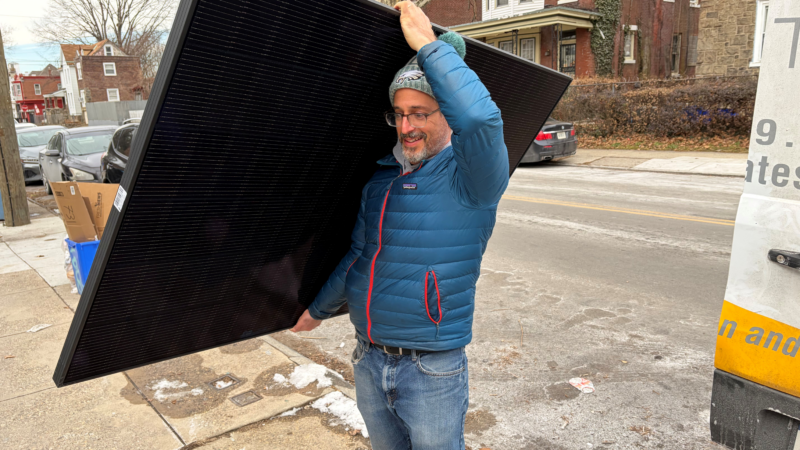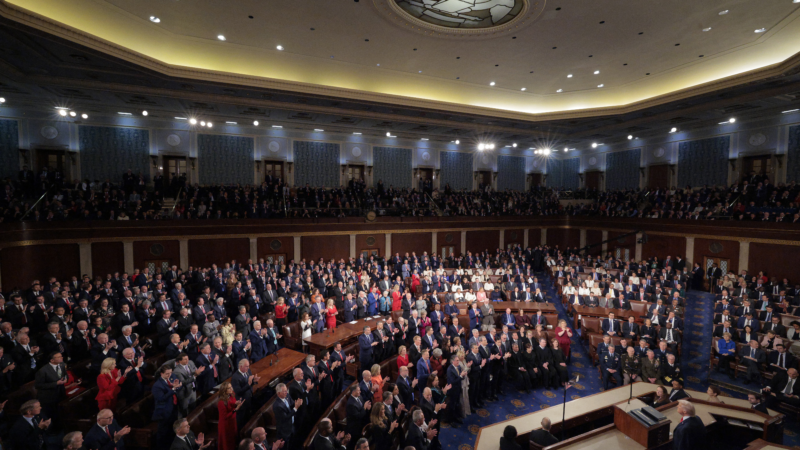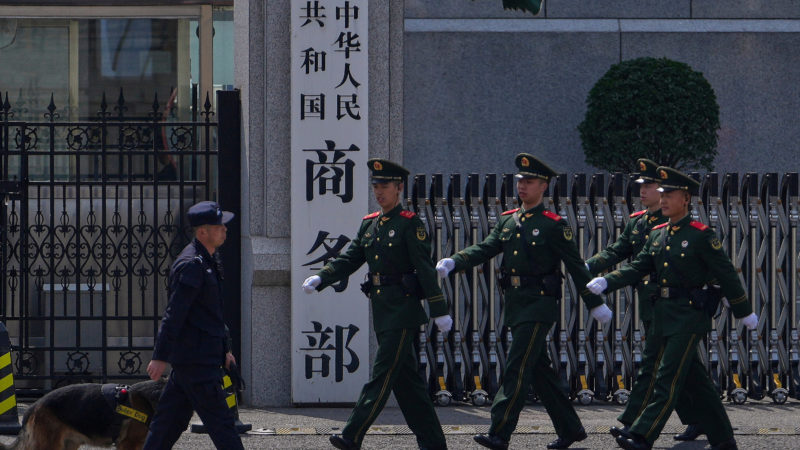As Trump’s tariffs take shape, is America really winning?
When it comes to tariffs, President Trump is clear: America is winning.
As his administration imposes sweeping tariffs across the world, President Trump argues the import taxes will make America “great” and “rich”, making the country once again the “most respected country anywhere in the world“, while ushering in a “golden age.“
But the reality so far is proving to be different.
Tariffs are sparking intense uncertainty in the U.S. and around the world — and it’s yet unclear how it will all end.
Here are five points that explain the effects of tariffs, from Main Street USA to China.
The U.S. is starting to feel the effects
For months the full impact of Trump’s tariffs was not quite clear.
A big reason was because Trump did set some tariffs — including a 10% tax on nearly everything the U.S. imports — but he also delayed many others. Many companies also rushed to import things before tariffs kicked in, and then held off from passing on the full costs of the implemented tariffs to consumers.
But that’s starting to change.
Inflation is picking up, with both consumer inflation and a separate inflation gauge favored by the Fed showing prices increasing more than the previous month.
The labor market is also starting to show signs of cooling. A report by the Labor Department last week showed only 73,000 jobs were added in July, less than the 100,000 jobs economists had anticipated.
It got worse: the report said the U.S. had added a whopping 258,000 fewer jobs in the previous two months than first estimated. In response, Trump fired the top official who had been in charge of gathering the data, accusing her — without evidence — of having manipulated the numbers.
In addition to a cooling labor market, the economy is also growing more slowly. Data last week showed the U.S. gross domestic product grew much slower in the first half of this year than in the previous two years.
But the full impact on the U.S. is not yet here
The effects of tariffs are likely to get bigger.
Trump has long claimed that tariffs will be paid for by countries that want to export to the country. In fact, most economists say that the tariff costs will likely be split: some of the costs will be paid by exporters overseas, some by importers in the U.S., and some by American consumers.
The Yale Budget Lab estimated last week that the average cost of Trump’s tariffs to the American household would be $2,400 this year, with clothes and textiles likely to see the biggest effects.
And contrary to Trump’s repeated claims that tariffs will boost the economy, experts believe the economy will get weaker, with higher inflation and slower job growth. And the weak labor market report last week will also likely spur more discussions about whether the economy could even enter a recession.
There is one consolation: for the most part, Trump’s tariffs are not as high as the ones he first unveiled in April.
The Yale Budget Lab now estimates the average effective tariff rate will be around 18.3%, compared to its initial estimate of an average of more than 20% after Trump’s “Liberation Day” announcement in April — but that’s still about a sixfold increase from what Americans were used to paying before Trump returned to the White House.
But here’s the other thing to keep in mind: tariffs, according to the Yale Budget Lab, will still be at their highest levels since 1935.

The U.S. will raise money from tariffs — but it’s still heavily in debt
Trump has often touted the revenues the U.S. could raise from tariffs as another justification for imposing them.
And indeed, money is coming in. According to data kept by the Treasury Department the U.S. has so far raised about $150 billion since tariffs took effect.
The Yale Budget Lab estimates tariffs could bring in more than $2 trillion over the period from 2026 to 2035.
That’s a substantial amount of money. The problem is that the U.S. is still heavily in debt — and Trump’s other policies, especially his massive tax cut and spending bill, which he calls the “Big Beautiful Bill,” will increase that debt. The Congressional Budget Office estimates the GOP bill would increase the federal debt by $2.4 trillion.
In other words, tariffs will indeed bring in money — but potentially not as much as Trump’s policies that will increase the national debt.
Another important thing to keep in mind is that predicting how behavior will change as a result of tariffs is hard — meaning that the Trump administration’s claims about how much money they bring in could prove incorrect.
American households could start spending less on imported goods since they will generally be more expensive. And foreign business could also start shipping less to the U.S., further reducing how much money the U.S. ultimately makes from tariffs.
The global economy enters uncharted waters
For decades, the U.S. was a reliable export market for everything from Chinese-made phones to French wines. Not anymore.
Tariffs will change the equation and countries around the world will feel the impact. The International Monetary Fund estimates the global economy will grow 3% this year, down from 3.3% last year — with some of that slowing growth due to Trump’s tariffs.
That’s not as bad as many — including the IMF — had initially feared, but as the report also makes clear, the world still faces a period of “persistent uncertainty.” Translation: nobody quite knows what will end up happening.

One likely outcome is that countries could export less to the U.S. and start looking for other markets — with unpredictable consequences around the world.
The biggest unknown centers around China. Though the U.S. has yet to clinch a trade deal with China — the only major economy so far that has stood up to Trump over tariffs — there’s fear the Asian economic giant will start steering more of its exports to other markets beyond America.
“A lot of these imported goods that are no longer finding a home in the U.S. will end up end up finding a home somewhere else,” says Michael Pearce, an economist with Oxford Economics, a global economy advisory firm, in New York.
Analysts point to a concrete example to explain how U.S. tariffs can have unintended consequences: electric cars from China.
America’s existing strong tariffs on Chinese car imports have already helped push many Chinese EV makers to focus elsewhere, particularly on the European market. Shipments of cheaper Chinese EVs to Europe surged so much the European Union was forced to sharply raise its duties last year in a bid to avoid getting flooded with more shipments.
Similarly, Trump’s latest tariffs risk a domino effect, leading other countries to raise their barriers for all kinds of goods.
“One thing of global trade wars is that they do tend to spread,” says Pearce. “Protectionism from the U.S. will eventually beget protectionism elsewhere.”
Trump is getting his trade wins — but the rest of the world is seething
Many people around the world voiced frustration as their governments have agreed — under pressure — to Trump’s tariffs.
For many, it was a bitter pill to swallow. French Prime Minister François Bayrou called the European Union deal — struck by European Commission President Ursula von der Leyen — a moment of “submission.”

The negative reaction was often compounded after Trump also claimed that countries such as Japan had agreed to hundred of millions of dollars in investments that would be carried out at his “direction.”
Officials in Asia second-largest economy rushed to clarify they were mostly loans. Nonetheless, a former official at Japan’s Trade Ministry called it “humiliating.”
“I call this the psychology of surrender,” says Alicia Garcia-Herrero, the Asia-Pacific chief economist for investment firm Natixis in Hong Kong. “Everybody is surrendering.”
That may lead to a near term reaction by foreign consumers against the U.S. — akin to how Canadians retaliated against Trump’s tariffs by avoiding American products.
But there may be far longer term consequences that are hard to foresee. Trump’s tariff tactics, for example, could change how countries view — or are willing to interact with — the U.S. eroding any trust or good will that the America may have built up, analysts say.
Garcia-Herrero believes it will ultimately be “detrimental for the U.S. in the long run” and will lead to “payback.”
“There’s no carrots, only sticks,” she says about President Trump’s tariffs. “And this is very hard to swallow.”
When a horse whinnies, there’s more than meets the ear
A new study finds that horse whinnies are made of both a high and a low frequency, generated by different parts of the vocal tract. The two-tone sound may help horses convey more complex information.
Trump’s many tariff tools mean consumer prices won’t go down, analysts say
The Supreme Court struck down President Trump's signature tariffs. But the president has other tariff tools, and consumers shouldn't expect cheaper prices anytime soon, economists say.
Hundreds of American nurses choose Canada over the U.S. under Trump
More than 1,000 American nurses have successfully applied for licensure in British Columbia since April, a massive increase over prior years.
Tax credits for solar panels are available, but the catch is you can’t own them
Rooftop solar installers are steering customers toward leases instead of purchases. Federal tax credits for purchased systems have ended but are still available for leased ones.
5 takeaways from Trump’s State of the Union address
President Trump hit familiar notes on immigration and culture in his speech Tuesday night, but he largely underplayed the economic problems that voters say they are most concerned about.
China restricts exports to 40 Japanese entities with ties to military
China on Tuesday restricted exports to 40 Japanese entities it says are contributing to Japan's "remilitarization," in the latest escalation of tensions with Tokyo.






